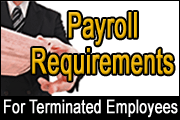Tennessee Final And Unclaimed Paychecks Laws
Final And Unclaimed Paychecks Laws In Tennessee
>>>
About Final Paychecks Laws In TennesseeState and federal law requires that employers give departing employees their final paycheck within a specified time period or - if a paycheck goes unclaimed - to follow state escheatment rules. The rules in Tennessee for both are included below.
 Tennessee's Requirements For When To Send Final Paychecks
Tennessee's Requirements For When To Send Final PaychecksTennessee are allowed to provide final paychecks within 21 days or on the next scheduled payday, whichever occurs later.
What Should Be Included In A Final Paycheck In TennesseeThe final paycheck should contain the employee's regular wages from the most recent pay period, plus other types of compensation such as commissions, bonuses, and accrued sick and vacation pay. Employers can withhold money from the employee's last paycheck if the employee owes your organization.
Can An Employer Withhold A Final Paycheck?Though an employer might be able to deduct the cost of the equipment from the final pay of non-exempt employees, they generally cannot withhold unpaid wages from ex-employees. Failure to follow state final paycheck laws could lead to fines and penalties, so be sure to consult with legal counsel before taking any actions to hold a final paycheck.
How To SendThe Final PaycheckBecause Tennessee does not have specific rules on how to send a final paycheck, the final paycheck can be paid via direct deposit (if an employee previously authorized direct deposit for wages), or by check or payroll paycard, either in-person or mailed.
Note that employers generally are not obligated to pay a terminated employee via direct deposit on his or her final paycheck.
For More Info On Final PaychecksFor more about Final Paychecks, go to
https://www.payrolltrainingcenter.com/payroll-requirements-for-terminated-employees-wt1000388>>>
About Unclaimed Paycheck Laws In TennesseeAmazingly, departing employees don't always collect all wages owed to them. Unfortunately, as a payroll professional, that becomes your problem.
Technically, unclaimed paychecks are subject to 'escheat' laws as unclaimed property under the laws of the state where the employee last worked. This means that employers are required to follow their state's laws for submitting unclaimed paychecks to the state. Not doing so can subject employers to fines and penalties.
 Tennessee's Requirements For Unclaimed Paychecks
Tennessee's Requirements For Unclaimed PaychecksThe following are the reporting and recordkeeping requirements for Tennessee's unclaimed paycheck laws:
- Recordkeeping Requirements
Employers must retain a record of the names and last known addresses of payees for ten years after reporting to the state - Reporting Requirements
Tennessee employers must report and remit unclaimed wages annually. Typically, the report for unclaimed wages must be sent before Nov. 1 of each year for wages unclaimed as of June 30 of that year
With regard to recordkeeping, Tennessee employers should speak with their legal counsel to determine processes and procedures re how many attempts the employer should make to contact ex-employees.
For More Info On Unclaimed PaychecksFor more about Unclaimed Paychecks, go to
https://www.payrolltrainingcenter.com/rules-for-unclaimed-paychecks-wt1000338Recommended Training Courses For Final And Unclaimed Paychecks:
Find Seminars, Webinars, And Online Training In Your Area
Contact Info For Final And Unclaimed Paycheck Requirements For Tennessee
Department of Labor & Workforce Development
220 French Landing Dr
Nashville, TN 37243
844-224-5818
www.tn.gov/workforce
Q & A About Final And Unclaimed Paychecks
Q: Can A Final Paycheck Be Paid Via Direct Deposit?A: Various states have requirements re how - and when - an employer must pay final wages. For instance, many states allow employers to pay final wages via direct deposit if an employee previously authorized direct deposit for wages, but these states often have rules regarding the timing of such payments. As such, definitely check with your legal counsel and/or your state's requirements.
Q: What Payments Should Be Included In A Final Paycheck? A: Depending upon the state, in addition to wages, the final paycheck might include vacation, severance, and any other payments due the ex-employee. Be sure to check with your legal counsel and/or your state's requirements.
Q: What Should Employers Do If They Cannot Find The Ex-Employee? A: Unclaimed paychecks are subject to escheat laws as unclaimed property - which means that employers cannot just keep the check/unused funds.
Q: Are There Penalties For Not Forwarding Uncashed Payroll Checks? A: Yes. Failure to comply with state regulations can result in audit assessments, significant interest accumulations, and criminal penalties. In fact, many states are looking at unclaimed wages as a source of revenue - and your organization could be that source!
Q: Is My Organization Subject To Penalties From Other States? A: Yes. The laws of the state where the employee last worked apply. Organizations with corporate headquarters in one state and employees in other states could be liable for penalties in all states that they have employees. As such, employers should return any uncashed paychecks to the state where the person last worked.
References and Disclaimers:
This information is based on a variety of state laws and regulations, and is subject to change. The PayrollTrainingCenter makes every effort to make sure this information is current and accurate, however, the PayrollTrainingCenter is not engaged in rendering legal or professional advice and shall not be held responsible for any inaccuracies contained herein.
Paycheck Fundamentals Training & Certification Program

 Tennessee's Requirements For When To Send Final Paychecks
Tennessee's Requirements For When To Send Final Paychecks
